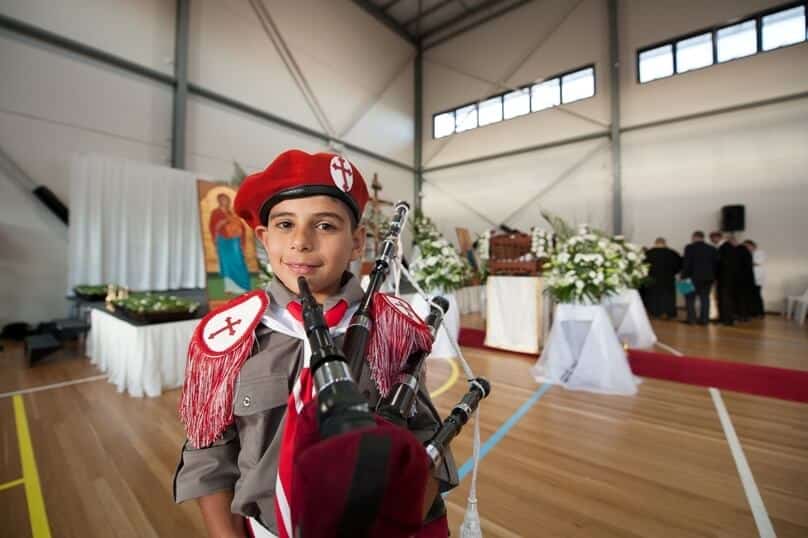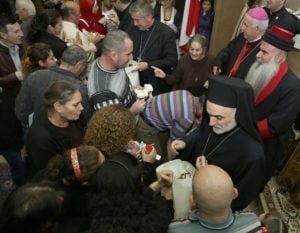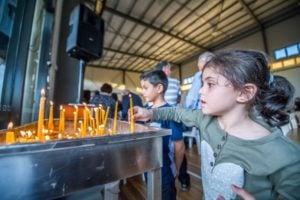
This is the edited text of an address given by the head of the Melkite Church in Australia, Bishop Robert Rabbat at 1 in Christ, a meeting of Christians from Eastern Catholic and Orthodox Churches in Sydney.
In ancient times, peace was often seen simply as the time between wars – it had no particular value in itself. When there was no war, people recovered from previous fighting and took the opportunity to prepare for battles to come. Aristotle considered the natural state of barbarians, that is non-Greeks, to be one of slavery, usually after defeat in battle. And in fifth century Athens the last abstract quality to receive an altar was erine – peace.
If we see the last 3000 years or so as a journey, a significant aspect of that journey has been the gradual realisation of peace as an essential and practical condition for human well-being and progress.
Regardless of historical revisionism – the post truth analysis of history – any unbiased observer cannot but appreciate the role that Christianity has played in the pacification of human society from the time of St Constantine the Great until the European Reformation.
Today, we are gathered as those who have inherited that tradition of peacemaking. It is a tradition that arises directly from sacred scripture and especially the teaching and example of Jesus as recorded in the gospels. For many people the most remembered gospel reference to peace is to be found in the Beatitudes, “Happy are the peacemakers for they shall be called the children of God.”
Throughout Sacred Scripture the word peace occurs some 429 times. The importance of peace in the uncertain world (of the children of God) was such that it became a standard form of greeting – “Peace be with you” – and we might note that it is often associated with an absence of fear. And so the two phrases, Peace be with you and Fear not are frequently joined as the best wish that could be offered.
However, we should keep in mind the numerous other references to peace that permeate the pages of the gospels. In the gospel of John our Lord compares the peace that He gives to that which the world gives … his peace is everlasting and it penetrates the very depths of our being … and from bitter experience, we know that the peace the world offers is often flimsy and short lived.
In much of the first world, we live in comparative security – certainly a state that is marked by an absence of direct warfare. Of course, the human tendency is to take our good fortune for granted. Here in Australia, peace has become something for which we do not have to work, it is something that we do not have to promote – it is simply the state in which we go about our daily business in safety. The bitter truth is that for a large part of the world’s population, the daily reality is one of violence, danger, persecution and bloodshed.

Although there is no single global conflict to match the general effect of the two world wars, we must sadly note that today much of the world is at war in numerous localised conflicts, not to even mention the widespread impact of terrorism. It has been suggested that limited but ongoing regional hostilities are the future of armed conflict.
In the Middle East, the situation is particularly complex as many of the old certainties have disappeared into new and constantly changing alliances. The lines between enemies and friends are regularly shifting and are often deceptively blurred.
Such a pessimistic view of our common future leaves many in a state of despair which in turn gives rise to varying degrees of isolationism … “What is the use? Let’s just look after our own patch of ground … the rest can fight it out.”
Today, we are gathered with peace as our theme – and we should note that it is a peace which is lasting and just. Although ceasefires can be brokered and treaties hammered out, rarely do they arrive at a lasting peace, and the outcome is often less than just for some of the parties concerned. And often contained within many so-called peace agreements are the seeds of future conflicts. It has been said, and probably with good reason, that the Second World War arose from the treaties made after the Great War of 1914-1918.
With all this in mind, we might well ask ourselves if a lasting and just peace is achievable in the Middle East … and perhaps, at first glance, we would answer in the negative. The difficult path to Middle Eastern peace is marked by the wreckage of negotiated border solutions and ceasefire agreements, along with countless failed security pacts and promises. At a worldly level – peace as the world gives – it would seem highly improbable. However, we know that the seemingly impossible is no barrier to the workings of God’s grace, the movement of the Divine and Holy Spirit.
It is a truism that in the East, we are great remember-ers. Although this has made for a great sense of continuity and a lively attachment to the past … it is perhaps also time that we learned to forget, or at least to put some things in an authentic perspective … and this applies to all religious communities. Although important, the past should not be absolutely normative. Interest in, and reverence for, the past, should not make us prisoners … What happened in the thirteenth century, for example, may be of great historical interest, but it should not blind us to the possibilities of the here and now … or paralyse our hopes for the future.
It was recently noted by one Western commentator that the rebuilding of the devastated areas of Damascus and urban Syria would require an almost super-human effort. It is worth remembering that Damascus has been continuously inhabited for the past five thousand years … It will not remain in ruins nor will it go away … And even in the midst of a barbaric conflict, we do well to keep in mind that it was Iraq which gave birth to the first urban civilisations … Iraq is not going to go away.
However, all this does not mean that we can simply sit back and leave all to the heroic citizens of the region, people from every faith community who have endured extraordinary suffering and yet who are still determined to overcome the present difficulties. Amongst these people, we have so many brothers and sisters, so many friends, so many who are members of the same Household of the Faith.
We must stand with them in this time of great need … And that will mean a fearless resistance in the face of the small but vocal anti-Christian, secularist elements in Australian society, and especially the Australian media.
We cannot afford to remain silent. There is a renewed and pressing need for an informed, intellectually supported polemic – a defence or explanation of our common Christian Faith…or as we would say in Arabic, dawi.
Although it is an unfortunate development, there has been a gradual de-Christianising of large areas within the Middle East. For us who live in the safety of the West, it is easy to bemoan this and to urge fleeing populations to remain. However, it is sobering to ask ourselves what we would do if, together with our families, we were caught in a war zone. Until the situation is normalised, we have no choice but to do all we can to assist in the resettlement of all legitimate refugees – and I stress, legitimate refugees – seeking asylum in the West.
My thoughts, and especially my hopes, turn to the young people of our several communities. There used to be a saying, popular in Victorian times, that children should be seen and not heard.

However, times have changed. We live in a global society that is practically an annex of cyberspace – our world is an information-based world. Young people are expected to have opinions … although, I would note, that these should be informed opinions. Our attitudes should not simply be those of the last person with whom we spoke, the last magazine we read or the last media commentator to whom we listened. If we speak from ignorance, if we simply mouth the platitudes of others, we very quickly become empty vessels making much sound.
Young people make yourselves heard … and especially if you are nearing voting age … And if you did not know, politicians will take increasing notice of young people the closer you come to voting age. Do not miss an opportunity to present the truth of the Middle Eastern situation.
For most people in the first world, the Middle East has long been terra incognita, an unknown place, or perhaps only an orientalists fantasy, and therefore a place little understood. Only recently have people outside the region become immediately aware of the lands beyond the Bosphorus … and unfortunately this has so often been because of a negative media image.
Our Australian young people of Middle Eastern heritage can do so much to correct the simplistic three minute news images of supposedly failed nations said to be beyond hope. You can do this by being the best citizens of this nation that you can possibly be. Do all you can to contribute to this society.
The earliest Middle Eastern migrants arrived in Australia in the first half of the nineteenth century. Their descendants are now to be found at every level of Australian society, and in every trade, profession and business. Our new arrivals have the same opportunities … and the same bright future awaits them.
The first Christians had a clear understanding that they constituted a single Community in Christ – there was, and there remains, “one faith, one baptism, one Lord.” (Eph 4:5) And as St Paul exhorts the Galatians, “As we have opportunity, let us do good to everyone, and especially to those who are of the household of faith.” (Gal 6:10)
We are also conscious that the Household of the Faith lives day to day in this world … Although Jesus says that we are not of this world any more than he, he also directs us to render to Caesar that which is Caesar’s … And so, with our gaze set firmly upon the kingdom which is to come, we must strive to make this present world a better place, one infused with Christian principles.
If we truly believe in the Lord Jesus Christ we must also believe that nothing can resist his will … And it is his will that between his followers, those who bear his name, there must be unity of heart and mind.
This does not require a monotonous sameness of culture, language, worship or spirituality. In its many ecclesial communities, the Church is clothed as with a splendid and varied garment. Oneness does not impose uniformity.
I must note that whilst the Christian Church has always been a varied Community, there would seem to be a strong secularist movement in Western society which seeks to impose a cultural and social narrative intolerant of any dissent. Australian public life is rapidly moving from a vaguely amusing political correctness to a narrow-minded intellectual fascism.
Australians have a proud history of defending the democratic rights of others – a generosity paid for in much blood shed on foreign fields. However, if we are not vigilant what was won at so great a cost in other places could well be lost at home.
Above all, it is now time for us to take up the sword – not the sword of the earthly warrior – but the most effective weapon, the sword of prayer … Prayer which arises from the love … love even of our enemies. St Maximus the Confessor writes that “the perfect love of the holy angels lies in their love of God and of each other”, and “If your brother does not wish to live peaceably with you, nevertheless guard yourself against hatred, praying for him sincerely and not abusing him to anybody.”
In contemporary Australia, there is a vigorous debate on virtually every aspect of our living together as an integrated and harmonious society. The Christian Church is not only one of the oldest world institutions, but one of the most diverse and richly experienced … This is the Household of the Faith that in fidelity to the Lord must reach out to a confused and uncertain world for no other reason than the love of Christ which urges us on. (2Cor 5:14)
This constant and unfailing awareness of our common Christian identity is the reason why we are gathered today. The recurring theme throughout the New Testament is the realisation that we are one in Christ.
It is my very happy task to thank the One in Christ group, the I-Melkite Youth, and all in our various communities who have laboured to make this gathering a success.
Soon we will celebrate Palm Sunday and the Great and Holy Week, culminating in the Glorious Pascha of our Lord, God and Saviour, Jesus Christ. This year the two Easters will coincide and we will greet the Risen Lord together … May it soon be every year that we celebrate the Feast of Feasts together.
Before His life-giving death, at the Last and Mystical Supper, Jesus offered to the Father what has come to be called the Priestly Prayer.
“I do not pray for these alone but also for those who will believe in me through their word” … Jesus speaks here of the apostles and of us, the apostolic Christians … And he continues, “May they be one, as You, Father are in Me, and I in You … that the world may believe You have sent Me.”
How then, can we not be one in Christ.
